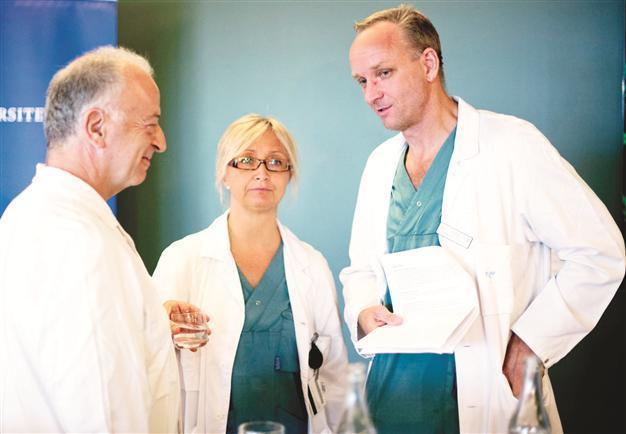Sweden duplicates Turkish op success
STOCKHOLM - Agence France-Presse

Swedish specialist surgeons are seen at a news conference in Gothenburg. The photo below shows Derya Sert who received the first uterus transplant last year. EPA photo
Two Swedish women received new uteruses at the weekend in the world’s first mother-to-daughter uterine transplants aimed at helping them have babies, Gothenburg University announced on Sept. 18.
Uterine transplants are new, with the first successful one conducted in Turkey in 2011. Turkish woman Derya Sert received the transplant at Antalya’s Akdeniz University and has since had normal menstruations.
“One of the women had previously had her own uterus removed after undergoing treatment for cervical cancer. The other woman was born without a uterus. Both women are in their 30s,” a statement from Gothenburg University said.
“More than 10 surgeons took part in the operations, which were conducted without any complications. The women who received the uteruses are doing well but are tired after the surgery,” said Mats Braennstroem, a professor of obstetrics and gynecology at the university and the leader of the research team.
“The mothers who donated their uteruses are already up and walking and are going to be able to go home within a few days,” he added.
Braennstroem explained at a press conference that the young women would have to wait one year before trying to get pregnant.
They will then undergo in vitro fertilization (IVF) with frozen embryos consisting of their own eggs fertilized with their partner’s sperm prior to the organ transplant procedure.
Its success will be seen in 2014 “So we will only really know if this is successful in 2014,” if and when the women have given birth to a child, Braennstroem said.
He would not speculate on the chances of the women becoming pregnant, but noted that in regular IVF treatments the chance of delivering a baby after an embryo transfer was 25 to 30 percent.
Braennstroem said the transplanted uteruses would be removed after the women have had “up to two children,” so they can stop taking the immunosuppressant medication that helps their bodies accept the transplant.
